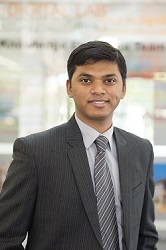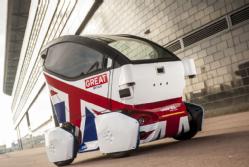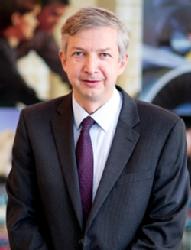WMG News
Let’s talk automotive advances
 Our Professor of Experiential Engineering Paul Jennings, will be presenting “The road to autonomous connected vehicles” at the Malvern Festival of Innovation next Wednesday (4 October).
Our Professor of Experiential Engineering Paul Jennings, will be presenting “The road to autonomous connected vehicles” at the Malvern Festival of Innovation next Wednesday (4 October).
The Festival, which runs from 2-6 October, takes place at the Morgan Motor Company, and will explore topics including how research and development is leading to new technologies to improve lives, and the new insights that are leading the way.
Professor Jennings’s talk will form part of the Automotive Advances programme, and will focus on self-parking and autonomous driving capabilities, and the next significant advances including how our roads might look in the future.
For more information on the Festival and the full Automotive Advances line-up visit: https://www.festival-innovation.com/
WMG Professor recognised at prestigious European automotive awards
 WMG’s Professor Paul Jennings, and his Experiential Engineering research team, have received a ‘Highly Commended’ accolade at the prestigious AutoSens Awards.
WMG’s Professor Paul Jennings, and his Experiential Engineering research team, have received a ‘Highly Commended’ accolade at the prestigious AutoSens Awards.
The automotive awards held in Brussels, recognise the greatest design, technical and marketing innovations within the automotive imaging sector.
Professor Jennings and his team were recognised as ‘Highly Commended’ in the Greatest Exploration category, for their inventive 3xD driving simulator, a key facility for our researchers working on Autonomous, Smart and Connected Vehicles.
Have your say on driverless cars – free public event
 Driverless cars – what do you think about them? Do you think they’ll improve our lives, or not? There’s a chance to have YOUR say in Coventry this month, at an Ideas Café event hosted by WMG, University of Warwick.
Driverless cars – what do you think about them? Do you think they’ll improve our lives, or not? There’s a chance to have YOUR say in Coventry this month, at an Ideas Café event hosted by WMG, University of Warwick.
Researchers from WMG’s Experiential Engineering Group are running a free event in the heart of the UK’s ‘motor city’, to explore the public’s attitudes towards self-driving cars, and to hear different thoughts on the future of motoring.
The event – which will take place at the Transport Museum on 30 June – will give participants the opportunity to discuss whether they trust driverless technology, and how they think self-driving cars will affect communities and the environment.
The event will be in the format of an Ideas Café which brings people together informally, over tea and cake to hear about and discuss the issues relevant to them.
Research finds care home design isn’t depressing – providing you can actually get outside
With around 40% of residents in UK care homes having significant depressive symptoms, researchers have questioned whether the design of the physical environment of homes could be contributing to the problem, and how this could be addressed. New research led by the University of Warwick has found that although the physical environment alone is unlikely to negatively affect the mood of residents, poor access to gardens and outdoor spaces could. Procedural, staffing and physical barriers can prevent older people using outdoor spaces and the researchers at Warwick Medical School and WMG at the University of Warwick have found that access to the outdoors is significantly associated with depressive symptoms.
There has been a growing interest in the role of the physical environment on health. An early study found that hospital patients residing in rooms with windows looking at a natural scene had shorter hospital stays. Another study found that brighter lighting reduced depressive symptoms in residents in assisted living facilities in the Netherlands. However whether the physical environment of care homes directly affects depression in residents was not as well understood until now.
Researchers at WMG and Warwick Medical School at the University of Warwick examined the relationship between the design of care homes and depressive symptoms of older people living in care homes, and have now published their results in the journal The Gerontologist in a paper entitled “The Impact of the Physical Environment on Depressive Symptoms of Older Residents Living in Care Homes: A Mixed Methods Study” https://doi.org/10.1093/geront/gnx041
Sebastian Conran to give Design@WMG seminar on ‘Form Follows Fabrication’
 World-renowned designer Sebastian Conran will be the guest speaker at a seminar on designing and manufacturing the future, part of the series of Design@WMG events hosted by WMG’s Experiential Engineering Group and WMG centre HVM Catapult.
World-renowned designer Sebastian Conran will be the guest speaker at a seminar on designing and manufacturing the future, part of the series of Design@WMG events hosted by WMG’s Experiential Engineering Group and WMG centre HVM Catapult.
Taking place on Wednesday 10th May in the International Manufacturing Centre, the talk entitled 'Form Follows Fabrication' will give attendees an insight into creating aspirational, innovative and successful user experiences, as Sebastian shares his experiences from 40 years in the design industry.
WMG researcher to pioneer development of next-generation manufacturing
 Dr Rebecca Cain, Associate Professor and Head of the Experiential Engineering Research Group at WMG, University of Warwick, has been selected to join the Engineering and Physical Sciences Research Council (EPSRC) Early Career Forum in Manufacturing Research.
Dr Rebecca Cain, Associate Professor and Head of the Experiential Engineering Research Group at WMG, University of Warwick, has been selected to join the Engineering and Physical Sciences Research Council (EPSRC) Early Career Forum in Manufacturing Research.
The EPSRC Early Career Forum (ECF) for Manufacturing Research has a strong focus on advancing the UK's international reputation in manufacturing research, through developing inter-disciplinary research agendas, and impacting upon research policy development. Ten new members are selected each year, in a competitive application process. Members of the Early Career Forum have the opportunity to interact with other early career researchers from across the breadth of engineering and the physical sciences, forming new professional networks that may generate future innovative research programmes.
WMG student Siddartha Khastgir to take part in the IMechE Global Engineering Debate
 WMG research student Siddartha Khastgir CEng MIMechE will be representing us at the prestigious IMechE Global Engineering Debate London 2016, on Wednesday 20 April at IMechE HQ, 1 Birdcage Walk.
WMG research student Siddartha Khastgir CEng MIMechE will be representing us at the prestigious IMechE Global Engineering Debate London 2016, on Wednesday 20 April at IMechE HQ, 1 Birdcage Walk.
The event has been organised by the Institution of Mechanical Engineers (IMechE) Greater London Young Member Panel.
This interactive event will feature four high profile young engineering speakers who will debate and try to answer the question: “Back to the future: What is the future of local transport?” The debate will cover automotive, public transport (rail and buses) and autonomous vehicles.
Siddartha will be debating for Autonomous Vehicles being the future of local transport while focussing on user-benefit, cost, environmental and economic impact.
In order to gauge whether the debate has an influence on audience opinions prior to starting, they will be asked to vote on which form of transport should be invested in to meet future demand. The vote will be repeated after the debate, and results compared to determine whether or not the opinions of the audience have changed.
For more information visit the IMechE Global Engineering Debate site.
site.
WMG tests driverless pods with laser scan of Coventry roads as part of Intelligent Transport Initiative

WMG at the University of Warwick is to use a laser scan of 30 miles of Coventry roads to test driverless pods as part of a research programme launched this week.
WMG will work with RDM Group - the UK’s only designer and manufacturer of driverless Pods - in a project called INnovative Testing of Autonomous Control Techniques (INTACT).
The project, funded by Innovate UK, will enable Coventry based automotive innovation experts RDM to test its vehicles on one of the world’s most adaptable and advanced driving simulators at WMG.
Expert Comment: Professor Paul Jennings
 Professor of Experiential Engineering, Paul Jennings comments on US plans $4bn for self-driving rules.
Professor of Experiential Engineering, Paul Jennings comments on US plans $4bn for self-driving rules.
Self-driving, or autonomous, vehicle technology is developing at a rapid rate. Many of the world’s largest vehicle manufacturers are already unveiling self-driving car solutions and are being joined in the race by new players such as Google, Tesla and UK initiatives such as those by RDM Automotive LTD.
The need for a consistent set of regulations and international testing standards, as identified by the $4bn US DoT initiative for common rules, is critical in bringing self-driving cars to our roads. We know for example that current rules require the use of trained drivers for testing, but we have to consider how to engage end-users early on in the testing of self-driving vehicles. I believe these factors are key to increasing public acceptance and trust in autonomous driving technologies.
Let's Talk Driverless Technology
 Professor of Experiential Engineering, Paul Jennings is pleased to be representing WMG at the Driverless Technology Conference and Exhibition (DTCE’15) on Monday (23 November) in London.
Professor of Experiential Engineering, Paul Jennings is pleased to be representing WMG at the Driverless Technology Conference and Exhibition (DTCE’15) on Monday (23 November) in London.
DTCE’15 will welcome around 300 delegates from across the entire driverless supply chain, and experts will explore the key issues in a mix of live demonstrations, seminars and workshops.
Professor Jennings will present ‘A Driver-in-the-Loop Simulator for Connected and Autonomous Vehicles’ in a special technical workshop alongside colleagues from Cranfield University, University of Coventry and the University of Leeds.
